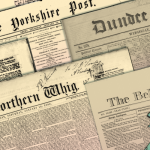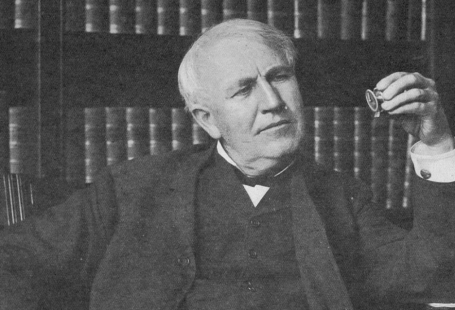Anyone starting to research their Irish heritage has heard the story: ‘all of their records were destroyed in 1922’. The destruction of the Four Courts on 30 June 1922, which housed the public records office, was a huge loss… but! with digitisation, Irish family history is getting easier by the day. Sites like our sister site Findmypast are opening up new avenues of research by digitising a wide variety of sources, and many of their Irish collections are free!
Newspapers are particularly good for Irish research because they replace lost records, in fact many pre-date official record keeping which didn’t start in earnest until the mid-1800s. Newspaper reports also contain details unavailable in traditional genealogical sources. The British Newspaper Archive can provide discoveries and details that will break down brick walls and add rich stories to your family history.
Newspapers have a very important role to play in researching your Irish family history.
Our Collection – a newspaper for every county & much more!
Our collection of Irish newspapers is growing all of the time. Today we have 211 Irish titles, which range in date from 1708-2009. They are all listed in our A-Z of titles. We have a newspaper for every county in Ireland, and many specialist titles, including Allnut’s Irish Land Schedule, Irish Society and the Irish Ecclesiastical Gazette. Simply click on Ireland to see and search the full list. You can then click on the name of a newspaper to go to its dedicated information and search page.
 You can also search our Irish titles by clicking on the map on the home page or by selecting the country in the side facets in search. You can narrow even further by selecting a region, county or place using the other facets available.
You can also search our Irish titles by clicking on the map on the home page or by selecting the country in the side facets in search. You can narrow even further by selecting a region, county or place using the other facets available.
Note: all of our places refer to the place where the newspaper was published, not where the stories come from.
What you will discover
Newspapers are an incredibly rich source. For general hints and tips on using newspapers for genealogy be sure to check out our other genealogy blogs, and our YouTube channel. We cover a variety of topics such as searching for migrant and military ancestors as well as sharing tips for getting the most from The Archive.
Birth, Marriage, Death Notices (& obituaries, & In Memoriam &c.).
Official Irish birth, marriage and death records are not comprehensive before 1864. Newspapers to the rescue! Family notices appear in the newspapers with regularity from the 1820s. Announcements of births, marriages and deaths often include details of next of kin, and can include addresses and occupational details. Families also published notices about family members who had emigrated to America or Australia, and those who emigrated often sent reports home to be published in their home town paper. Obituaries give details of a person’s life such as their occupation, any charity work they took part in and their hobbies. Obituaries also contain details about extended family which can help you make invaluable connections. In Memoriam entries were printed for decades after the death of a loved one. Some marriage notices even listed all the gifts that the couple recieved!
 You can narrow your search to ‘family notices’ using our filters.
You can narrow your search to ‘family notices’ using our filters.
But for your first search we recommened narrowing to a decade of interest and including a place name to find the greatest number of results for a given name.
Hint: Use quote marks to search for an exact phrase or name, and remember first names won’t always be published e.g. “Mrs Lovely”
Replacement for lost records
In 1922 Ireland lost census records, court records and wills. Newspaper reports can be used to piece together the information found in these records.
- Death notices and obituaries often include details of next of kin and addreses of the deceased.
- Court reports in newspapers are extremely detailed and you may even get to read what your ancestor said in court – search for quarter sessions, assizes and petty sessions.
- Property sales after a person’s death can give insight into their lifestyle.
No village is too small
To understand your ancestors’ lives you need to know more than when they were born and when they died. The place they came from is part of their character and had a strong influence on their life. In Ireland the smallest ‘place’ a person can live is a street or townland. Townlands can be as small as one acre. You will get many rewarding results by searching newspapers for a townland name. You can discover disputes between tenants and landlords, and the facilites and employment available to the people in the area such as mills and workhouses.

Example: We did a search for Cregaree, a townlad 240 acres in size (0.33 of a squrae mile) in County Mayo and discovered that a light railway was planned between it and Ballinrobe, 8 miles away, in 1887. The small article also shows how Cregaree has historically been considered to be in Galway rather than Mayo.
Context and Influences
The big national stories are not always those that affect our ancestors’ lives directly. Our rich collection of local newspapers allows you to get to the heart of your ancestors’ lives. Newspapers report on the local events which have not been recorded in the history books but which shaped our acestors’ lives and influenced their decisions.
Our top 3 tips
Always remember our top tips, or golden rules for newspaper searches
- Your ancestor didn’t need to be able to read the newspaper to appear in the newspaper!
- Search beyond your local area, Irish news-stories are found in all our English, Welsh & Scottish papers
- Try different name combinations: Mr Smith, Mr John Smith, Mr J. Smith, Miss Smith, Mrs Smith, Mrs John Smith, Mrs J Smith (women were more often known by their husband’s name)
Register now and explore the Archive
We are always delighted to hear your stories, tweet us @BNArchive or send us a message on Facebook or email.






